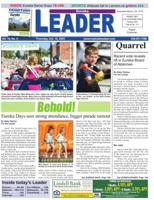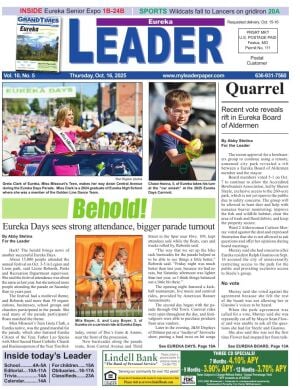For Jefferson County Clerk Ken Waller, the upcoming Tuesday, Nov. 8, election may come down to one word: Patience.
“What I would really like to see is patience on the part of everyone involved, the voters and the poll workers. This election isn’t going to be easy, but if we all work together, we will be successful,” he said.
As Waller and Jeannie Goff, the office’s chief of staff, were in the middle of a weeklong training session for poll workers, he pointed out that a possible shift in the new state law requiring all voters to present a photo ID before they are allowed to cast a ballot is making training a challenge.
“We don’t know what’s going to happen, or when it’s going to happen,” Waller said of two legal challenges to that new state requirement that have been filed in Cole County Circuit Court in Jefferson City.
Waller said if the law, which was passed by the General Assembly earlier this year and took effect Aug. 28, withstands the legal challenges, voters must present a driver’s license, a state-issued non-driver’s license, a military ID or a passport before they are issued a ballot.
In the past, a postcard sent to voters by the County Clerk’s Office was considered proper ID, and other photo IDs such as those issued by schools and workplaces were accepted, he said.
He said non-driver’s licenses can be obtained at any state Department of Revenue license office or authorized Motor Vehicles office or a contracted license office, such as those in Imperial, De Soto, Festus, Arnold and High Ridge.
Those who come to the polls without a valid photo ID will be allowed to cast a provisional ballot. A team of verification workers will check the voter’s signature on a form accompanying the provisional ballot against the signature on file in the County Clerk’s Office when that voter registered, Waller said.
That process may take days, depending on the number of provisional ballots that need to be verified.
“We’ll definitely be keeping a close eye on what the courts say, but until we hear otherwise, we’re acting as if photo IDs will be required,” Waller said.
Possibly further complicating matters is that Waller is expecting a higher voter turnout than the average midterm general election.
Goff said typically, November elections in non-presidential election years attract about 53 percent of voters, but Waller is calling for as much as 65 percent this time around.
“We’ve got a very contested U.S. Senate seat at the top of the ballot, and we’re also seeing a lot of interest in the marijuana issue,” he said.
Missouri voters will be asked in November whether marijuana should be made legal for recreational use.
“I don’t think we’ll get up to 70 percent. Seven out of 10 registered voters, that’s a lot,” Waller said. “But I think it could get at least 65 percent.”
Goff said voters will see a different kind of ballot – 17 inches long rather than the standard 11 inches – to accommodate the verbiage accompanying the marijuana question as well as four other statewide ballot issues.
Those deal with changing the authority of the state treasurer, increasing the funding for police forces established by the Missouri Board of Police Commissioners (currently there’s only one in the state, in Kansas City) and making the Missouri National Guard its own state department.
A fourth statewide question asks voters to call for a convention to revise the state Constitution.
“Not many people know about these,” Waller said. “They haven’t gotten the publicity that the marijuana question has – and that’s going to slow down voters who aren’t familiar with those issues and will want to read all the words. And frankly, the way they write these constitutional amendments is confusing.”
Waller suggested that voters check the Missouri Secretary of State’s website (sos.mo.gov) to check the text of statewide issues on the ballot and the “fair language” that summarizes each one.
Goff said at the 18 to 20 polling places that have more than 3,800 registered voters, two ballot machines will be brought in to streamline the checkout process.
“Voters who have already had to wait in a line to check in and get their ballot shouldn’t also have to wait in a line to put their ballot into the box,” she said.
She said the extra-long ballot will take a couple of extra seconds to process, but if the turnout is heavy, those seconds can add up.
“Also, in some polling places, there’s not a lot of room for a waiting line to put the ballot in the box,” she said. “Having two of them should keep things moving.”
In the northwest part of Jefferson County, another wrinkle has developed for voters in County Council District 1. A registered write-in candidate, Steve Kasten of the Eureka area, has emerged to challenge incumbent Brian Haskins, who defeated three other Republican candidates in August and otherwise faces no challengers.
Waller said tabulating a higher-than-normal volume of write-in votes will also pose a challenge to the verification team, and suggested that voters understand that they must fill in the circle next to “write in” on the ballot and clearly write their choice.
Only registered write-ins are allowed to win in races that have at least one candidate, and under state law, anyone who lost a primary election is not allowed to win in that general election.




